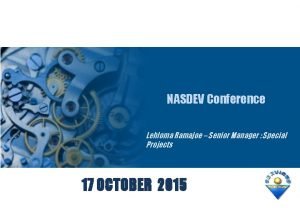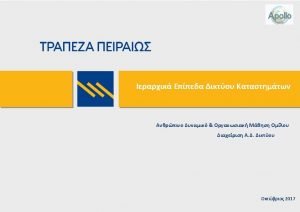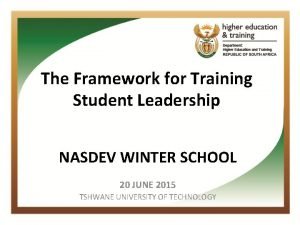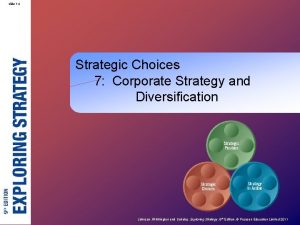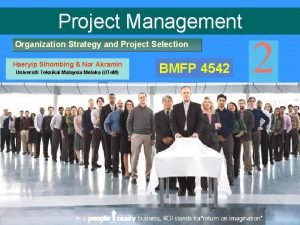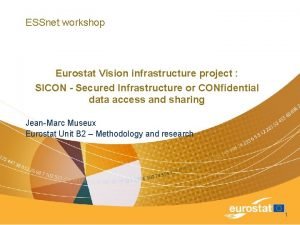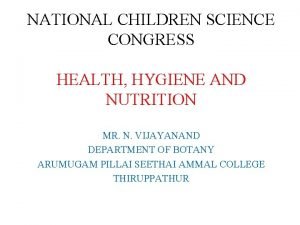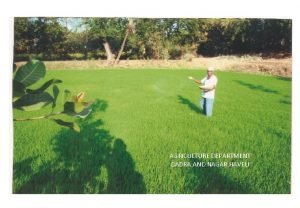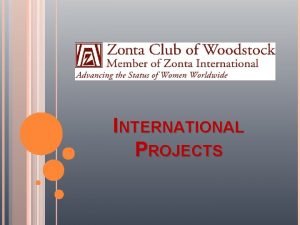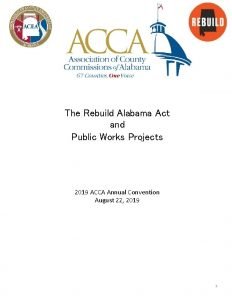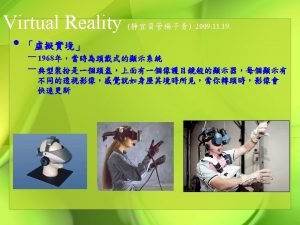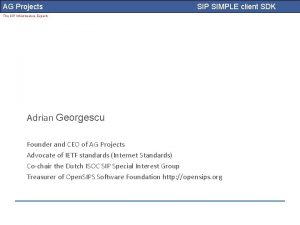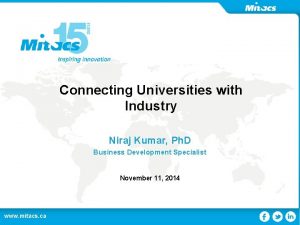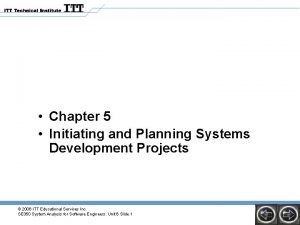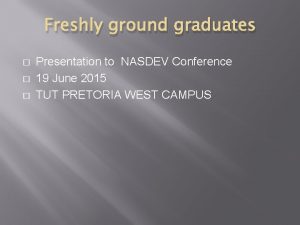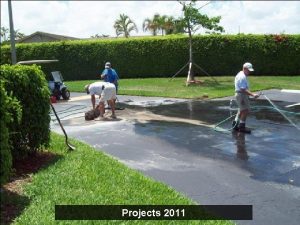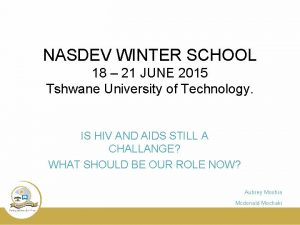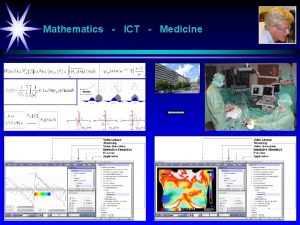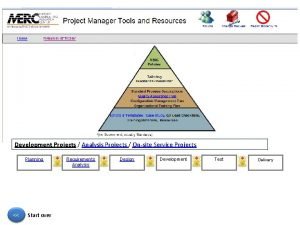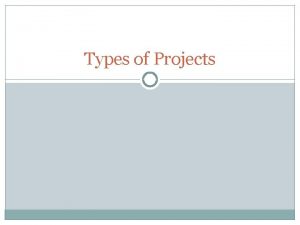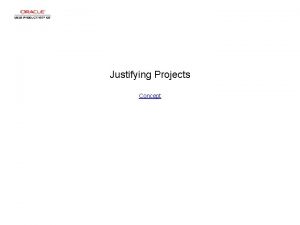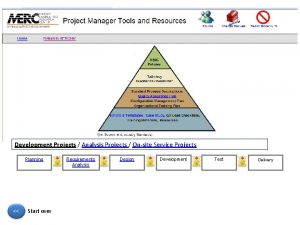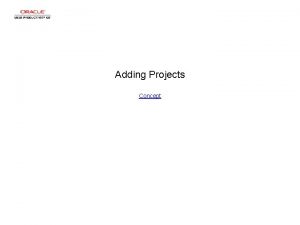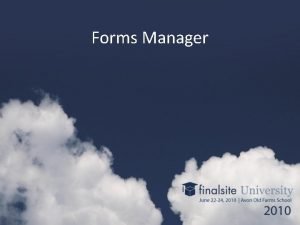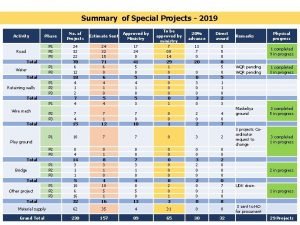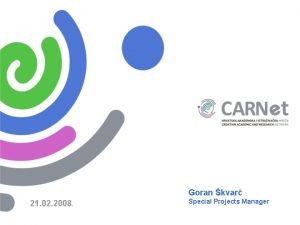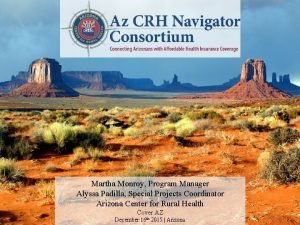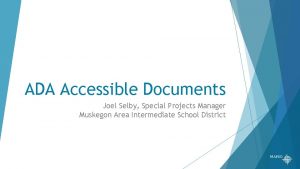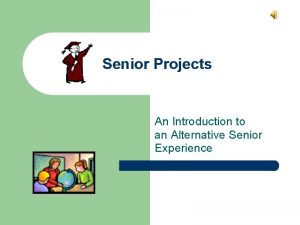NASDEV Conference Lehloma Ramajoe Senior Manager Special Projects































- Slides: 31

NASDEV Conference Lehloma Ramajoe – Senior Manager : Special Projects 17 OCTOBER 2015

Vision of NSDS III • • • To establish a credible institutional mechanism for skills planning Increasing access to occupational –directed programmes Promoting the public TVET college system that is responsive to skills needs and priorities at all levels (SLR&N) Addressing the low levels of youth and adults language and numeracy skills Encouraging better use of work-based skills development NSDS I : Equality and the need to cultivate lifelong learning in the workplace environment

Vision of NSDS III • Encouraging and supporting cooperatives; small enterprises; worker initiated; NGO and community training initiatives • Increasing Public sector capacity for improved service delivery and supporting the building of a developmental state • Building career and vocational training NSDS II: Equity, quality training and skills development in the workplace

The levies collected from employers via SARS as 1% skills development levy are what SETAs utilise to achieve their stated mandate Skills Development Levy 100% Services SETA 80% Administration 10% National Skills Fund 20% Grant fund 69, 5% Discretionary grant 49, 5% Mandatory grant 20%

SSETA is one of 21 Sector Education Training Authorities • Report to Minister of Higher Education and Training as part of Department of Higher Education Training (DHET) • 5 year licence (current NSDS III 2011/2 to 2015/16) • SETAs established in 2000 in terms of Skills Development Act (Act 97 of 1998) Social Financial Services Manufacturing Resources • • • • • • HW SETA LG SETA SACETA PSETA ETDP SETA Bank SETA FASSET INSETA MICT SETA Services SETA W&R SETA CATH SETA TETA Mer SETA FPM SETA CHIETA Food Bev MQA CETA AGRI SETA EW SETA

The main purpose of the Services SETA is to close the skills gap in the services • The Services SETA facilitates skills development sector within the Service Sector through – Developing qualifications – Accrediting training providers – Certification of learners • Skills development is supported by disbursement of Services SETA funding within the Services Sector • The Services SETA promotes development of qualified learners

The Services SETA has 6 chambers representing the sub-sectors it supports Cleaning and hiring services Marketing and communications Labour and collective services Management and business services Personal care services Real estate and related services

The Services SETA determines skills needs and invests in developing skills within these sectors out of the SA economy 1. Cleaning and hiring services chamber 1 2 Hiring services 3 Household services 4 Cleaning services Domestic services

The Services SETA determines skills needs and invests in developing skills within these sectors out of the SA economy 2. Communication and management services chamber 1 Marketing and communications 2 Contact centres 3 Postal services

The Services SETA determines skills needs and invests in developing skills within these sectors out of the SA economy 3. Labour and collective services chamber 1 Labour recruitment services 2 Collective services • Professional organisations/bodies • Bargaining councils and dispute resolutions • Associations, federations and umbrella bodies

The Services SETA determines skills needs and invests in developing skills within these sectors out of the SA economy 5. Personal care services chamber 1 2 Hair care 3 Beauty treatment 4 Funeral services Fashion

The Services SETA determines skills needs and invests in developing skills within these sectors out of the SA economy 6. Real estate and related services chamber 1 Real estate services • Includes auctioneers

The grant regulation prescribes that SSETA allocate 80% of its discretionary grant to PIVOTAL programmes PIVOTAL is an acronym which means: Pi Vo T Professional Vocational Technical and A Academic L Learning programs These result in qualifications or part qualifications on the National Qualifications framework as contemplated in regulation 3 (6) and (7) as read with regulation 6 (11) to (15) • • Learnerships Apprenticeships Trade tests Internships Bursaries Adult education and training Recognition of prior learning Skills programme

The Services SETA policies and imperatives guide in allocating funding to organisations The following imperatives are a focus area for the Services SETA: • Supporting learners in rural areas, those with disabilities as well as woman and the youth • Funding internships and interventions that allow school learners a full qualification and opportunity to enter the work place. Cooperatives and NPOs are encouraged to apply for unemployed interventions • Priority sectors including funeral services, marketing, project management, hair care and beauty services, household

Learnership Definition This is a structured learning programme which includes theoretical and practical workplace experiential learning over a period of at least 12 months and which leads to an occupationally related qualification registered on the NQF. Funding: R 18, 000 per employed learner R 36, 000 per unemployed learner of which R 1, 500 must be payable to the learner monthly

Apprenticeships Definition Artisan: A person certified as competent, via a trade test, to undertake a listed trade in accordance with relevant legislation. Apprenticeship: A learning programme towards the achievement of a listed trade, which includes a trade test in respect of that trade. It covers theory, practical and structured workplace learning (on the job training) Funding: R 46, 450 per learner per annum, of which R 2, 500 must be payable to the learner as a monthly stipend

Assessment and trade tests Definition Assessment: The process used to identify, gather and interpret information against the required competencies in a qualification or part qualification in order to make a judgment about a learner’s achievement Trade Test: This is a final external practical and summative assessment undertaken by candidates who meet the requirements included in an occupational qualification for a listed trade that is administered by an accredited trade test centre. The trade certificate is issued by the QCTO Funding: R 4, 500 per learner

Internships Definition An internship is a structured and monitored workplace experience gained through exposure and interactions within a real work environment SSETA funds 4 types of Internships: HET NQF 5 and above (Full Qualification): This internship is a 12 month workplace experience programme designed for candidates who have already completed an NQF Level 5 and higher qualification that is relevant for employment in the services sector, but have not yet gathered the necessary practical experience to enable them to obtain employment. Funding: R 36, 000 per learner, of which R 2, 500 must be paid to the learner as a monthly stipend

Internships Definition FET Part Nated Qualification (N 6 Only): This internship is an 18 months workplace experience programme designed for candidates who have already completed an N 6 qualification relevant for employment in the services sector, but have not yet gathered the necessary practical experience to enable them to obtain a National Diploma Funding: R 36, 000 per learner, of which R 2, 500 must be paid to the learner as a monthly stipend FET Post NCV and Vocational Qualification: This internship is a 12 months workplace experience programme designed for candidates who have already completed an NQF level 1, 2, 3 or 4 national vocational qualification that is relevant for employment in the services sector, but have not yet gathered the necessary practical experience to enable them to obtain employment Funding: R 24, 000 per learner, of which R 1, 500 must be paid to the learner as a monthly stipend

Internships Definition HET NQF 5 and above (Part Qualification): This internship is a 12 months workplace experience programme designed for candidates who have already completed an NQF Level 5 and higher part-qualification relevant for employment in the services sector, but have not yet gathered the necessary practical experience to enable them to obtain the full qualification Funding: R 36, 000 per learner, of which R 2, 500 must be paid to the learner as a monthly stipend

Bursaries Definition A bursary is a monetary award made to learners to follow an approved course of study. This is a Grants awarded to employed learners enrolled for part qualifications or full qualifications registered on the NQF level 5 and higher (this is not for learnerships) Funding: R 35, 000 per employed learner enrolled for NQF 5 or higher R 35, 000 per unemployed learner

Adult education and training Definition This is formal learning and training undertaken by adults for the improvement of their knowledge and skills for personal development, further learning and/or employment. This learning must result in a General Education and Training Certificate Funding: R 6, 000 per learner

Recognition of prior learning Definition Principles and processes through which the prior knowledge and skills acquired by a person are identified, mediated and assessed for purposes admission to a formal course of study, recognition and certification Funding: R 6, 500 per learner

Skills programmes Definition This learning intervention has been designed to be an occupationally based, short term learning programme. When successfully completed by the learner, it constitutes credits towards a qualification registered on the NQF. The Skills Programme comprises of a cluster of unit standards derived from the same qualification between 25 and 60 credits Funding for this intervention will only be provided to Employers for the up-skilling of their own employees towards a full qualification Funding: R 8, 100 per learner

Understanding the application process: Special Projects are aimed at ensuring the participation of public institutions and non-profit making organisations in the Services SETA skills development framework. The purpose of these projects is to provide training in the priority areas of government and the Services SETA annual performance plan • Special projects can be applied for at any time throughout the year, even outside the advert window for regular projects • Projects for Khayalitsha and Fetakgomo have been funded through Special Projects 25

Strategic Objectives of Special Projects • • To promote the achievement of transformational imperatives and national priorities as per the National Skills Development Strategy III i. e. disability, rural development interventions, placement of FET learners, etc. Qualifying applicants for special projects: Public institutions incl. SOEs and TVETs, Industry Bodies, Unions and NGOs Learning interventions include PIVOTAL and non PIVOTAL Unit costs in certain instances to be determined on a project basis Special Projects are run under the mandate of the Board

SKILLS DEVELOPMENT CENTRES Contracted Party Skills Development Centre Amount Motheo TVET College Artisan Development Academy R 400 000. 00 North West Provincial Government North West Skills Development Centre R 15, 000 Umgeni Municipality Merrivale (near Howick) Skills Development Centre R 15, 000 e. Thekwini Municipality Kwa. Ximba (near Cato Ridge) Skills Development Centre R 15, 000 Paul Pietersburg Skills Development Centre R 15, 000 Sakhisizwe Local Municipality Cala Skills Development Centre R 15, 000 Kokstad Skills Development Centre Greater Kokstad Municipality R 15, 000 RPL Centre R 15, 000

Structure of a well written proposal Section 1: Background information Section 2: Overview of the project proposal Section 3: Breakdown of the project Section 4: Impact on beneficiaries Evidence to support the proposal application: • Host letters • Company registration documents • Tax clearance certificate Section 5: Impact on community • Signed declaration of interest Section 6: Hosting arrangements • Signed declaration of authorised person Section 7: Risks and constraints Section 8: Declaration of authorised person Section 9: Declaration of interest • Project implementation plan • Project budget

Services SETA has different processes for special and regular funded projects Criteria Regular projects Special projects Timing Specific advert window (advertised in newspapers) Unsolicited all year round applications accepted Mode Online portal applications Manual/email proposal submitted Evaluation on pre-determined criteria followed by accounting authority approval Accounting authority pre-approval followed by proposal alignment to Services SETA objectives Due diligence conducted to assess capacity and capability Pre-contracting Learners recruited, project plans and budgets submitted, training providers selected, dedicated bank account opened 29

How to contact the Services SETA website: www. serviceseta. org. za Contacts: Lehloma. R@serviceseta. org. za 011 276 9734 Provincial offices in all the Provinces of South Africa 30

Thank You! 31 31
 Levy ramajoe
Levy ramajoe Senior manager vs general manager
Senior manager vs general manager Nasdev
Nasdev Senior development manager
Senior development manager Gnld senior manager
Gnld senior manager Portfolio manager synergy manager parental developer
Portfolio manager synergy manager parental developer Project screening matrix example
Project screening matrix example Forays company
Forays company Reading fair examples
Reading fair examples Big data software open source
Big data software open source Web design projects for high school students
Web design projects for high school students Rajasthan telecom circle
Rajasthan telecom circle Guidebook on apec projects
Guidebook on apec projects Small capital projects
Small capital projects It & telecom projects in punjab
It & telecom projects in punjab Sicon projects
Sicon projects National children's science congress projects ideas
National children's science congress projects ideas Irrigation projects in dadra & nagar haveli
Irrigation projects in dadra & nagar haveli Managing multiple projects objectives and deadlines
Managing multiple projects objectives and deadlines Zonta international projects
Zonta international projects Rebuild alabama projects
Rebuild alabama projects Higher thinking skills through it-based projects
Higher thinking skills through it-based projects Grobi projects
Grobi projects Independent reading project
Independent reading project Htt://scratch.mit.edu/
Htt://scratch.mit.edu/ A series of coordinated related multiple projects
A series of coordinated related multiple projects Sip client sdk
Sip client sdk Mitacs(dot)ca/en/programs/accelerate/open-projects
Mitacs(dot)ca/en/programs/accelerate/open-projects Two projects
Two projects Risk management in telecommunication projects
Risk management in telecommunication projects Ctrl 365
Ctrl 365 Initiating and planning systems development projects
Initiating and planning systems development projects
